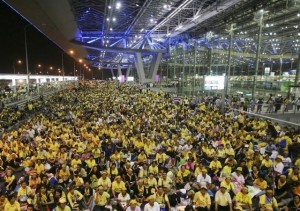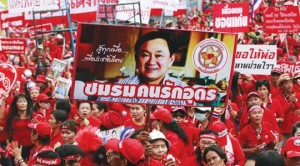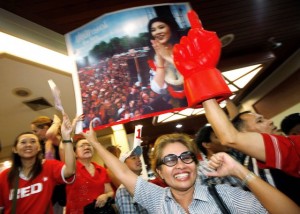I don’t agree with the coup, but now that they’ve done it, I support it because Thaksin has refused to resign from his position… Allowing Thaksin to carry on will ruin the country more than this. The reputation of the country may be somewhat damaged, but it’s better than letting Thaksin stay in power.
(University student Sasiprapha Chantawong, CBS News, September 19, 2006)
This reflected the prevailing view among Thais after the military ousted Prime Minister Thaksin Shinawatra five years ago. The military justified this coup by accusing him of engaging in the kind of personal enrichment at the public’s expense that led to the celebrated ouster of Ferdinand Marcos of the Philippines.
But here, in part, is how I commented on this coup back then:
I appreciate how difficult it would be to disabuse anyone of the sentiment this student expresses. And I suspect that the vast majority of Thais share his (resigned) rationalization about this coup.
Nonetheless, even a benign (i.e., popular and bloodless) coup is not only inherently inconsistent but also politically untenable in a democracy. After all, no matter the extent of Thaksin’s corruption (highlighted by an insider’s deal where he allegedly sold his family’s stake in a state telecommunications company to Singaporeans for $1.9 billion), constitutional provisions were in place to either impeach him or vote him out of office at elections that were due to be held within months.
(Thailand’s benign coup, The iPINIONS Journal, September 20, 2006)
 This is why it seemed almost schizophrenic when Thailand descended into years of political instability after this coup, pitting Thaksin loyalists (aka Red Shirts) against opposition forces (aka Yellow Shirts). I chronicled these developments in appropriately cynical fashion:
This is why it seemed almost schizophrenic when Thailand descended into years of political instability after this coup, pitting Thaksin loyalists (aka Red Shirts) against opposition forces (aka Yellow Shirts). I chronicled these developments in appropriately cynical fashion:
Recall how Thais reacted with blithe resignation to the 2006 military coup against Prime Minister Shinawatra. It seems ironic therefore that they took to the streets – defying the military and eventually taking over Thailand’s two main airports last week, stranding over 300,000 tourists – to protest against his democratically elected successors.
Specifically, Thais protested first against Samak Sundaravej – whom they accused of being a Thaksin puppet. Samak succeeded Thaksin after democratic elections in December 2007. He was eventually ousted in September 2008 after the court ruled, somewhat expediently, that he violated conflict of interest laws.
Then they protested against Somchai Wongsawat – who succeeded Samak and whom they also accused of being too loyal to the ousted Thaksin, his brother-in-law.
At any rate, after months of more protests – growing so formidable in size and nihilistic determination that not even the country’s vaunted military could squash them – the court ruled yesterday, again somewhat expediently (not to mention belatedly), that Somchai’s governing coalition committed electoral fraud. Then, affirming mob rule, the court banned him from politics.
So here’s to hoping that Thailand’s third prime minister this year can prove beyond all doubt that he not only thoroughly hates Thaksin but is also completely loyal to the king.
(Thailand suffers another coup, this time by an angry mob, The iPINIONS Journal, December 8, 2008)
 Well, that third prime minister turned out to be Abhisit Vejjajiva. There was even great hope that his December 2008 election would finally usher in a period of stability in Thai politics – given that Thaksin fled into exile in August 2008 before the end of his trial on corruption charges. Unfortunately, this only led to more unrest which was highlighted last year when thousands of Red Shirts took to the streets:
Well, that third prime minister turned out to be Abhisit Vejjajiva. There was even great hope that his December 2008 election would finally usher in a period of stability in Thai politics – given that Thaksin fled into exile in August 2008 before the end of his trial on corruption charges. Unfortunately, this only led to more unrest which was highlighted last year when thousands of Red Shirts took to the streets:
For over seven weeks about 100,000 poor farmers held Thailand practically hostage. They barricaded themselves in encampments in the middle of downtown Bangkok where they held daily rallies demanding dissolution of parliament, early elections, and a battery of democratic reforms. Most of them were clearly motivated by their abiding support for former PM Shinawatra… These Red Shirts could be forgiven for thinking they would have their way. After all, similar protests in recent years resulted in the ouster of two prime ministers…
By contrast, the Yellow Shirts were poised to mount counter protests – clearly motivated by their abiding opposition to former PM Thaksin. No doubt this is why the government held such a hard line against the farmers (Red Shirts), knowing full well that it could summon just as many Yellow Shirts into the streets in a show of support.
(Thailand’s Tiananmen Square, The iPINIONS Journal, May 21, 2010)
 This brings me to national elections that were held, again, on July 3. Most commentators are hailing the outcome because Thailand elected its first female prime minister. But I fear her election will only set the stage for more civil unrest; not least because she happens to be Thaksin’s wholly inexperienced younger sister, Yingluck Shinawatra (44), who everyone believes is just his political puppet.
This brings me to national elections that were held, again, on July 3. Most commentators are hailing the outcome because Thailand elected its first female prime minister. But I fear her election will only set the stage for more civil unrest; not least because she happens to be Thaksin’s wholly inexperienced younger sister, Yingluck Shinawatra (44), who everyone believes is just his political puppet.
Thaksin himself was not eager to raise her profile within the party, and was more focused on finding ways to keep his own hand active in politics.
(Former Deputy Prime Minister and “close Thaksin ally” Sompong Amornvivat to U.S. Ambassador to Thailand Eric John from WikiLeaks cable of their meeting on September 9, 2009)
Well, he clearly found a way; not that Yingluck was ever remotely interested in even appearing to be standing on her own – given that her stump speeches were punctuated with this unabashedly nepotistic plea:
If you love my brother, will you give his younger sister a chance?
 Anyway, even though Prime Minister Abhisit conceded graciously and military leaders duly saluted her victory, I doubt the Yellow Shirts will stand by and allow Thaksin to rule over them again – by proxy from exile in Dubai.
Anyway, even though Prime Minister Abhisit conceded graciously and military leaders duly saluted her victory, I doubt the Yellow Shirts will stand by and allow Thaksin to rule over them again – by proxy from exile in Dubai.
Especially because Thaksin seems to believe that his little sister’s top priority should be forcing the government to grant him amnesty and return the $1.2 billion in assets it confiscated after he fled.
But the reason I am truly conflicted about her election is that nobody has been a more avid champion of woman power in politics than I:
Here’s to “the fairer sex” – not only as indispensable guardians of home and hearth but also as invaluable (and capable) stewards of the ship of state!
(Bachelet becomes first female president in South America, The iPINIONS Journal, December 12, 2005)
Nevertheless, just as electing an obvious dingbat like Sarah Palin as president of the United States would do nothing to advance the noble cause of women in politics, electing an obvious puppet like Yingluck as prime minister of Thailand will do nothing to advance this noble cause.
Related commentaries:
Thailand’s benign coup
Thailand’s Tiananmen Square